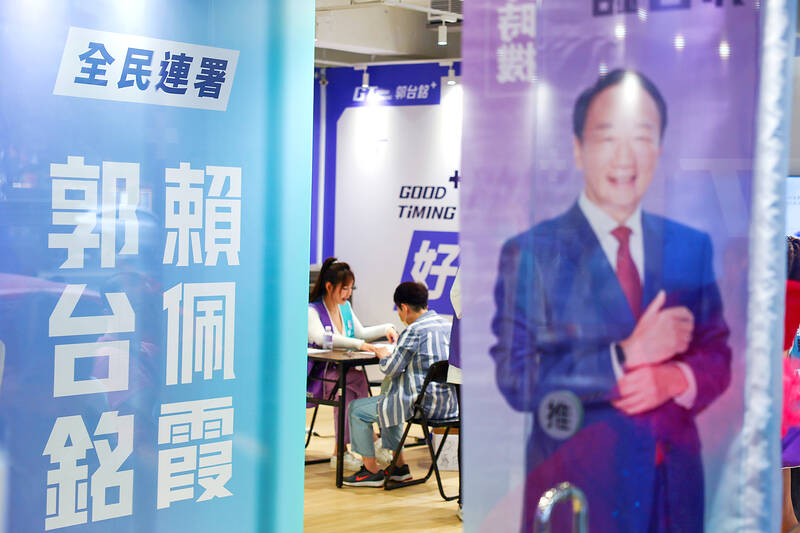One person has been detained, while six others have posted bail after being questioned by prosecutors on suspicion of purchasing personal information to use in Hon Hai Precision Industry Co (鴻海精密) founder Terry Gou’s (郭台銘) signature drive to appear on next year’s presidential ballot.
The detainee, a woman surnamed Shen (沈), and the other six were questioned by the Taipei Shilin District Prosecutors’ Office after being linked to an investigation into reports that some people were being paid NT$400 for their signatures, while others had no idea why their names were among the signatures gathered.
The seven are suspected of buying customer lists from pawnshops in New Taipei City and using the information for the signature drive, prosecutors said.

Photo: CNA
The suspects face charges for breaching the Presidential and Vice Presidential Election and Recall Act (總統副總統選舉罷免法), prosecutors said, adding that people who offer bribes and other undue benefits for a person’s signature during such a drive can be sentenced to up to seven years in prison and fined up to NT$10 million (US$309,138).
Similar cases have been reported across Taiwan, National Police Agency Director-General Huang Ming-chao (黃明昭) said yesterday.
Police are investigating reports of bribery, people buying lists of personal information and other illegal activities that have allegedly taken place at Gou’s signature drive stations, Huang said.
Local media reported that a business tycoon surnamed Chen (陳), who owns several hot spring hotels and properties in Taipei’s Beitou District (北投), was one of the six suspects who posted bail.
He reportedly paid NT$3 million, the highest bond posted, while the lowest paid was NT$15,000.
Gou’s campaign spokesman Huang Shih-hsiu (黃士修) denied any direct relationship with the suspects.
“Those local stations ... embroiled in bribery allegations are not associated with our official offices for Gou’s signature drive. We have nothing to do with those involved, and the people at our offices do not even know [them],” he said.
“When we started the signature drive, from day one, we stressed that there would be no financial benefit for people to sign on, as Guo and his aides have explicitly forbidden any illegal activities,” Huang Shih-hsiu said. “We shall cooperate with prosecutors for the investigation.”
Gou canceled all planned appearances yesterday, leading to speculation that it was was due to the investigation or because Chinese tax authorities had searched Hon Hai’s offices in China.
Gou’s campaign office yesterday morning announced that he would not attend a banquet at Jhongsing Temple (忠興宮) in New Taipei City’s Shulin District (樹林), which he had planned to attend with Taiwan People’s Party Chairman and presidential candidate Ko Wen-je (柯文哲).
Gou’s running mate, Tammy Lai (賴佩霞), took his place.
Huang Shih-hsiu said that Gou had just made changes to his personal itinerary and had not canceled because of either investigation.
“But Gou felt it was not quite proper, so he arranged for ... Lai to take his place ... [at] the Jhongsing Temple activities,” Huang said.
Additional reporting by Yang Kuo-wen
and Huang Ching-hsuan

CHAOS: Iranians took to the streets playing celebratory music after reports of Khamenei’s death on Saturday, while mourners also gathered in Tehran yesterday Iranian Supreme Leader Ayatollah Ali Khamenei was killed in a major attack on Iran launched by Israel and the US, throwing the future of the Islamic republic into doubt and raising the risk of regional instability. Iranian state television and the state-run IRNA news agency announced the 86-year-old’s death early yesterday. US President Donald Trump said it gave Iranians their “greatest chance” to “take back” their country. The announcements came after a joint US and Israeli aerial bombardment that targeted Iranian military and governmental sites. Trump said the “heavy and pinpoint bombing” would continue through the week or as long

TRUST: The KMT said it respected the US’ timing and considerations, and hoped it would continue to honor its commitments to helping Taiwan bolster its defenses and deterrence US President Donald Trump is delaying a multibillion-dollar arms sale to Taiwan to ensure his visit to Beijing is successful, a New York Times report said. The weapons sales package has stalled in the US Department of State, the report said, citing US officials it did not identify. The White House has told agencies not to push forward ahead of Trump’s meeting with Chinese President Xi Jinping (習近平), it said. The two last month held a phone call to discuss trade and geopolitical flashpoints ahead of the summit. Xi raised the Taiwan issue and urged the US to handle arms sales to

BIG SPENDERS: Foreign investors bought the most Taiwan equities since 2005, signaling confidence that an AI boom would continue to benefit chipmakers Taiwan Semiconductor Manufacturing Co’s (TSMC, 台積電) market capitalization swelled to US$2 trillion for the first time following a 4.25 percent rally in its American depositary receipts (ADR) overnight, putting the world’s biggest contract chipmaker sixth on the list of the world’s biggest companies by market capitalization, just behind Amazon.com Inc. The site CompaniesMarketcap.com ranked TSMC ahead of Saudi Aramco and Meta Platforms Inc. The Taiwanese company’s ADRs on Tuesday surged to US$385.75 on the New York Stock Exchange, as strong demand for artificial intelligence (AI) applications led to chip supply constraints and boost revenue growth to record-breaking levels. Each TSMC ADR represents

Pro-democracy media tycoon Jimmy Lai’s (黎智英) fraud conviction and prison sentence were yesterday overturned by a Hong Kong court, in a surprise legal decision that comes soon after Lai was jailed for 20 years on a separate national security charge. Judges Jeremy Poon (潘兆初), Anthea Pang (彭寶琴) and Derek Pang (彭偉昌) said in the judgement that they allowed the appeal from Lai, and another defendant in the case, to proceed, as a lower court judge had “erred.” “The Court of Appeal gave them leave to appeal against their conviction, allowed their appeals, quashed the convictions and set aside the sentences,” the judges